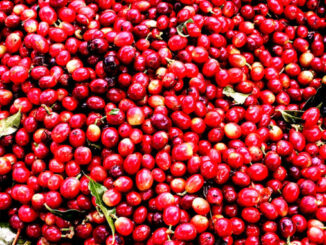
Among the lesser-known species of coffee, Coffea liberica var. robusta — sometimes referred to as Nganda or Koukou — stands out as a rare and distinct variant of the Liberica coffee species.
Despite its name, this variety is not related to Coffea canephora (true Robusta), but rather a botanical variation within the Liberica family, known for its exceptional resilience, size, and bold flavor.
🌿 Botanical Classification
- Scientific name: Coffea liberica var. robusta
- Common names: Nganda coffee, Koukou coffee
- Parent species: Coffea liberica
- Family: Rubiaceae
- Native region: West and Central Africa
This variety represents a natural variant or local ecotype of Liberica that evolved in humid, low-altitude regions of Africa, where both Liberica and Robusta (Coffea canephora) are present.
Because of its similar growth habit and hardiness, it was historically confused with Robusta coffee — hence the misleading varietal name robusta.
🌍 Origin and Distribution
Coffea liberica var. robusta is thought to have originated in Central and West Africa, particularly in areas of Sierra Leone, Ivory Coast, and Cameroon.
It was later identified in parts of Uganda and Congo, where it was locally referred to as Nganda or Koukou coffee.
The variety developed naturally in tropical lowlands, adapting to high humidity, heavy rainfall, and acidic soils — conditions unsuitable for Arabica but ideal for Liberica types.
Today, it remains a rarely cultivated and mostly wild-growing coffee type, found sporadically in African and Southeast Asian forests.
🌱 Plant Characteristics
Coffea liberica var. robusta shares many traits with other Liberica varieties, but exhibits unique adaptations that make it extremely tough and productive.
Key characteristics include:
- Tree height: Up to 12–15 meters — tall and woody, similar to standard Liberica.
- Leaves: Large, dark green, and glossy with pronounced veins.
- Cherries: Oval and large, with thick pulp.
- Beans: Asymmetrical, almond-shaped, slightly smaller than typical Liberica beans.
- Root system: Deep and strong — excellent for drought resistance.
- Growth rate: Faster than other Liberica strains.
This plant’s durability and fast growth made it a promising candidate for lowland cultivation in tropical climates.
☕ Flavor Profile
The flavor of Coffea liberica var. robusta reflects its unique Liberica heritage — intense, aromatic, and complex.
Common tasting notes include:
- Heavy body with rich texture
- Woody and nutty undertones
- Low acidity
- Sweet aftertaste with hints of dark chocolate
- Slightly smoky or earthy aroma
Compared to traditional Liberica coffee, the Nganda/Koukou type tends to be less floral and more full-bodied, with a stronger, darker character.
💧 Growing Conditions
Coffea liberica var. robusta thrives in:
- Altitudes: 200–800 meters
- Temperature: 22–30°C
- Rainfall: 1,500–2,500 mm annually
- Soil: Slightly acidic, well-drained tropical soils
Its ability to tolerate poor soils, heat, and humidity makes it an important resource for climate-resilient coffee breeding.
🧬 Relationship to Other Coffee Species
Although its name includes “robusta,” Coffea liberica var. robusta is genetically distinct from Coffea canephora (Robusta).
The confusion arose during the 19th century, when explorers and botanists found this vigorous Liberica type and assumed it was a Robusta variant due to its similar strength and growth pattern.
In reality:
- Coffea liberica var. robusta belongs to the Liberica lineage, along with C. liberica var. dewevrei (Excelsa).
- Coffea canephora (Robusta) is an entirely separate species, closer to Coffea congensis.
This distinction is important for taxonomy and breeding, as Liberica variants often possess unique resistance genes and flavor qualities not found in Robusta.
🌾 Agricultural Value and Use
While Coffea liberica var. robusta is not commercially significant on a global scale, it holds potential value for coffee research and hybridization.
Agricultural advantages:
✅ High resistance to pests and diseases
✅ Tolerates heat and poor soil conditions
✅ High yield potential
✅ Suitable for lowland tropical farming
Limitations:
❌ Difficult manual harvesting due to tall trees
❌ Inconsistent bean size and cup quality
❌ Limited market demand
❌ Requires long processing times due to thick pulp
Despite these challenges, its strong genetic base could prove useful in developing new climate-resilient hybrids.
🧪 Role in Hybrid Development
Botanists have explored Coffea liberica var. robusta for crossbreeding with other species — especially Robusta (C. canephora) and Arabica (C. arabica) — to combine flavor, strength, and adaptability.
Although direct hybridization is difficult due to genetic distance, experimental crosses have produced vigorous and disease-resistant offspring, valuable for future breeding projects.
☕ Cultural and Regional Significance
In regions like West Africa and the Congo Basin, local farmers historically cultivated Nganda or Koukou coffee for domestic consumption and local trade.
The coffee was appreciated for its strong taste and energy-boosting effect, similar to Robusta but smoother in texture.
Today, it remains a symbol of traditional African coffee heritage, alongside Excelsa and Liberica Barako from Asia.
❤️ Final Thoughts
The Coffea liberica var. robusta (Nganda or Koukou) is a fascinating reminder of coffee’s botanical diversity.
Though overshadowed by Arabica and Robusta, it holds great value as a resilient, flavorful, and historically significant variety.
Its genetic toughness and distinctive flavor could play a vital role in sustainable coffee production as climate challenges intensify.
☕ Liberica var. robusta — the forgotten strength of Africa’s coffee forests.
DeliciousPath: Enjoyment in Every Moment
Explore the Gourmet on Board category for exquisite flavors that elevate your meals, even when you’re on a boat, and the Coffee category for aromatic coffee blends that make every moment special. DeliciousPath is here to turn every experience into something unforgettable!
























